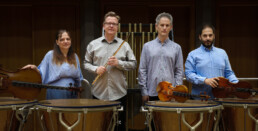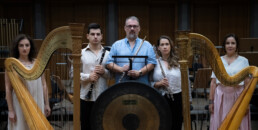Classic Rock IX
After last year's unprecedented success, 9th Classic Rock returns to the Herodeion for one more meeting of SepticFlesh with the Athens State Orchestra. The Piraeus Vocal Ensemble LIBRO CORO will complement the unique spectacle. SepticFlesh symphonic/metal live was presented for one and only time in 2019 at the "Metropolitan Theater of Mexico City" with the Mexico Symphony Orchestra, featuring 140 musicians and a 40-member choir. It was a top-tier sold-out concert attended by more than 3500 spectators. Five years later, this project comes to Greece, promising a unique music experience at the world’s most emblematic concert hall, the Herodeion, under the Athens Acropolis and the Attica starry night. The world famous Dutch lead musician, Koen Schoots shall conduct the Athens State Orchestra.
Piano Quintet
The concert's two piano quintets, the first composed in 1887 and the second in 1914, have several, essential common grounds: both are composed under a romantic idiom and draw a significant part of their themes from the special musical tradition of their composers' countries, Czechia and Hungary correspondingly. In addition, in both Quintets, piano and strings interact dynamically and intensely, thus rendering them two among the most seducing works of the piano quintet genre.
Healing Music
The decade of 1820's was undoubtedly an exciting period for the musicophiles of Vienna. Mature and isolated from the rest of the people due to his profound deafness, Ludwig van Beethoven turns almost exclusively to his favorite string quartet, thus creating unprecedentedly complex and beautiful works. His big admirer, Franz Schubert, of assured recognition through his excellent songs, enriches the chamber music repertoire with some of his most important works. In 1824, Schubert composes his quartet No. 13 in A minor to be called "the Rosamunde quartet" due to the melody used in the second movement, taken from the homonymous scenic music. In 1825, Beethoven presented his quartet No. 15, also in A minor, the third movement of which, “Song of Thanksgiving to the Deity from a convalescent in the Lydian mode”, is a sincere confession from the bottom of the great composer's heart, following a serious health problem he had faced.
20 years since the death of Ligeti
On the occasion of his mother's death, Brahms explored the rear sound combination of violin with French horn and piano, composing this trio that now occupies a major position within his rich work for chamber music ensembles. A bit more than a century after, Ligeti, who was very little engaged in small chamber music ensembles, wrote a "Hommage to Brams" Trio, precisely to accompany the German composer's work in concert programmes.
A night in Lilipoupoli
"Children, stick your ears on your radios. There's a surprise for you. Today, the Third Program finally broadcasts Lilipoupoli (the TinyTown)". It is with these words that the radio broadcasting of legendary Lilipoupoli started on Monday, December 19, 1977 at 09:30 AM. Nowadays, Chronos Ensemble, with the addition of Athina Kapsetaki and the collaboration of the soprano Vasia Zacharopoulou and the "12 notes" Children's choir, attempts to remind us the music, as well as some of the most beloved songs then created for a radio program of historical spontaneity, fantasy and boldness, "EDO LILIPOUPOLI"! (Voice of the TinyTown!)
From Austria to a New World
The concert "From Austria to a New World" featuring works for flute and string trio, is a musical journey across countries and centuries. The programme includes renowned works, such as the overture to Mozart's opera "The Magic Flute" transcribed for flute, violin, viola and cello, as well as A. Dvorak's "American" quartet, transcribed for the same ensemble by the famous flutist Emmanuel Pahud. Alongside, less known works are presented, such as Hoffmeister's flute quartet in C minor and the Hungarian composer's Léo Weiner's quartet for flute in C minor.
Aenaon ensemble and friends
The "Aenaon" String Quartet, dynamically present for many years in the domestic chamber music field, collaborates with the double bassist, Nikos Tsoukalas and the pianist Popi Malapani in two major works of late Romanticism: the Czech composer's Antonin Dvorak's String Quintet No. 2 and the English Edward Elgar's Quintet for piano correspondingly.
From Poetry to Music...
The programme follows the paths of inspiration: Debussy is inspired by Bilitiis's erotic poetry (Bilitis is supposed to be a devotee of Sapho), and frames it with emotive, atmospheric soundscapes, while his contemporary composer and classmate, Maurice Emmanuel studies the ancient Greek music and is seduced by the former's innovative attitude. The posterior Japanese composer, Toru Takemitsu draws original material from the Japanese musical tradition, while assimilating Debussy's writing emotiveness, elliptical move and asymmetrical rhythms, as characteristically projected in his work, Rain Spell (1982.
Tribute to Panagiotis Stefos
Panagiotis Stefos is a distinguished trombonist and educator with a notable presence in the Greek music scene. His love for music and his dedication to the trombone have made him one of the most respected and beloved musicians and teachers of his generation, offering his skill and sensitivity in every performance. He is closely associated with Lyraulos, the musical ensemble that revives ancient Greek music and its instruments. With passion and respect for tradition, he contributes significantly to the artistic development of the ensemble and actively participates in its educational and cultural activities. His presence in "Lyraulos" is not merely musical; it is deeply educational and spiritual. With ethos, knowledge, and dedication, he helps bridge the past with the present, illuminating the timeless power of music.
Bass Euphoria
Concert of double bass quartet of the Athens State Orchestra.
Works for four double basses, original and transcriptions, composed by Bach, Ward, Lawes, Verancini, Brahms, Brumby, Osborne, Piazzolla and Runswick.







